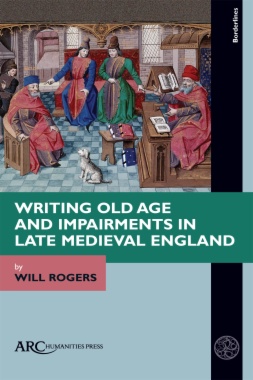The old speaker in Middle English literature often claims to be impaired because of age. This admission is often followed by narratives that directly contradict it, as speakers, such as the Reeve in Chaucer's Canterbury Tales or Amans in Gower's Confessio Amantis, proceed to perform even as they claim debility. More than the modesty topos, this contradiction exists, the book argues, as prosthesis: old age brings with it debility, but discussing age-related impairments augments the old, impaired body, while simultaneously undercutting and emphasizing bodily impairments. This language of prosthesis becomes a metaphor for the works these speakers use to fashion narrative, which exist as incomplete yet powerful sources.
- Front Cover
- Half-title
- Series information
- Title page
- Copyright information
- Table of contents
- Acknowledgements
- Introduction: Staves and Stanzas
- Old Man Yells at Cloud: Old Bodies and Common Complaints
- Four Aging Authorities: Aristotle, Cicero, Juvenal, Maximianus
- Chapter 1. Crooked as a Staff: Narrative, History, and the Disabled Body in Parlement of Thre Ages
- The Timeliness of Age: Narrative Economies and Young Minstrels in Wynnere
- Narrating Age: The Old Stories of Elde
- Worthy Narrations
- Chapter 2. A Reckoning with Age: Prosthetic Violence and the Reeve
- General Portraits of Age and Ability
- Dirty Tricks and Textual Transgressions
- Chapter 3. The Past is Prologue: Following the Trace of Master Hoccleve
- Politics is Prologue
- Hoccleve’s Trace and Empty Inheritances
- Erasing Prosthesis: Printing Paratexts
- Broken Bodies and Narrating Destruction: Troy and Caxton
- Imprinting Age: Caxton’s Cicero
- Papa Don’t Preach: Correct Texts and a Genealogical Tradition
- The Old Terms of Prosthesis
- Polychronicon and Old Histories
- Chapter 4. Playing Prosthesis and Revising the Past: Gower’s Supplemental Role
- Restoring Prostheses: Gower’s Old Speech Fills the Gaps
- Remember Gower’s Old Body
- “This ’longs the Text”: Gower as Medieval Prosthesis
- Epilogue: Impotence and Textual Healing
- Works Cited
- Primary Sources
- Secondary Sources
- Index

